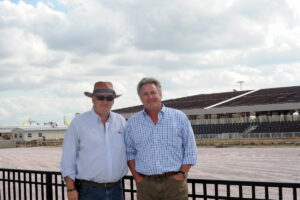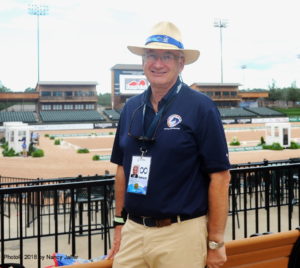Wellington, Florida’s Equestrian Preserve Committee Thursday night unanimously rejected a proposal to change the land use and master plan on property slated for a much-needed addition to the Wellington International showgrounds, raising questions about the future of that expansion.
Wellington International is best known as the home of Global Equestrian Group’s Winter Equestrian Festival, which draws competitors from around the world and hosts 2,500 to 3,000 horses each week during its run from January through March. It also holds smaller shows in other seasons.
This was the the second evening in a row that the Equestrian Preserve Committee turned down a rezoning proposal involving The Wellington, a two-segment project.
It is a major revision of a concept presented to the committee last September by entrepreneur Mark Bellissimo, managing partner of a group that owns the land involved. Bellissimo and his daughter, Paige, have since formed Wellington Lifestyle Partners with developer Nexus Luxury Collection, one of private investment firm Tavistock’s largest portfolio investments.
The Wellington South segment, where the Wellington International showgrounds expansion would be located, covers 269.39 acres at the northwest corner of South Shore Boulevard and Lake Worth Road, east of Gene Mische Way. WLP also seeks to develop up to 197 single-family residential units on the eastern 173.46 acres of the parcel.
Wellington North, on the northeast corner of South Shore Boulevard and Pierson Road, is 101.87 acres that includes White Birch and Equestrian Village, home of the Global Dressage Festival at the Equestrian Village. That proposal calls for removing about 96 acres from the Equestrian Preserve Area and the Equestrian Overlay Zoning District, changing the land use to residential, and developing a 300-unit residential project. The committee was unanimous in its rejection of that plan on Wednesday.
Concern was expressed during the discussion that once acreage was taken from the preserve, it would be a slippery slope leading to more loss of land for equestrian purposes.
Expansion of Wellington International by another 80 contiguous acres would mean more space to spread out than is available in the current cramped layout, even as dressage is moved from the Equestrian Village to the current Wellington International grounds, which it would share with the hunters, while jumpers would be on the additional land. Expansion also would open the door to solving access problems causing current traffic woes and offer far more parking than is available on the 94 acres at the current site.
The Preserve Committee is only an advisory group. The Planning, Zoning and Adjustment Board is slated to consider the project next month, and in August, the fate of the proposals are scheduled for a vote by the Village Council.
If the rezoning for the showgrounds expansion doesn’t go through, “We have to regroup and see what our options are,” said Wellington International President Michael Stone. That would involve looking at purchasing other lots close to the show, he suggested.
Committee members expressed concern that although they saw extensive plans for development of high-end homes and recreational amenities, as well as a golf course purchased for $35 million, they hadn’t been given any details about the showgrounds expansion, beyond construction of nine rings and a stadium that could seat 7,000.
“I do recognize that Global Equestrian Group’s plans need to be clearer and more tangible,” said Doug McMahon, managing director of the Tavistock Group, co-founder of Nexus Luxury Collection and the chief executive officer of Wellington Lifestyle Partners.
Although Nexus is not involved with what will be built at the expanded showgrounds, McMahon agreed, “That’s such a critical part. We’ll try to help them (GEG) get there.”
Stone said that Global Equestrian Group has a signed agreement for purchase of the showgrounds with Wellington Equestrian Partners, also headed by Bellisimo, but no money for the property has changed hands. Asked if the developer would be funding the horse show, Stone replied it would not.

Michael Stone and Mark Bellissimo at Equestrian Village when it was under construction in 2012. (Photo © 2012 by Nancy Jaffer)
“Wellington Equestrian Partners is holding the land hostage, will sell it if all of this approved. What that has to do with this Tavistock neighborhood — nothing, except they say they may get some people in here that might go to a horse show,” said Jane Cleveland, chair of the preserve committee.
“Global Equestrian Group is not in this application at all. If the applicant was really in favor of supporting the horse show industry, they would sell you the land…but you can’t buy it unless all of this gets approved. If the applicant was truly in support of the horse industry they would sell you the land without the strings.”
That comment drew applause from the audience.
Committee member Dr. Kristy Lund observed that “if you build and build and build, you lose the character of why Wellington people come here,” another remark greeted with applause.
“I don’t want to vote on the houses when I don’t know what’s going to happen with the new equestrian center they want to build. We need to see the plans, we need to see what’s going on,” said Carlos Arellano, one of seven preserve committee members.
Earlier in the evening, he commented about Wellington’s ambience, “We don’t want to change; we want to keep it the way it is.”
Dan Rosenbaum, an attorney for Wellington Equestrian Partners, said the developer “can bring to the table the infrastructure and the hospitality that’s needed in order for you to continue to be the (winter) equestrian capital of the world. You don’t see the other side of it, which is the fact that revenues are needed are needed to support these shows.”
Discussing the overall plan, McMahon noted that a luxury community “of this magnitude and magnetism we would bring” represents an incremental $200 million investment “before we even embark on selling real estate.”
Many of those in the packed meeting room appeared to be skeptical of the plans, saying what is needed are more four-acre farms within hacking distance of the horse show, rather than luxury houses.
McMahon responded, “I do think we would attract equestrians, I do think we would attract next generation equestrians, I do think we would attract patrons and sponsors and interested people to equestrian sport here if we create our kind of community.
He noted the majority of Wellington’s housing stock predates 2005 or even 2000.
“The most beautiful architecture and the most beautiful construction I’ve seen in the community are the barns,” he mentioned.
“There’s an opportunity to create a housing product and a club community here that is at the standard of what Wellington is as the horse sport capital.”
At the same time, he cautioned, “You cannot do a community of this size and scale and quality with 100 residential homes.”
Seventeen people spoke, with most expressing concern about maintaining the equestrian lifestyle that is the reason they live in Wellington.
Lynda Sirota, president of the Equestrian Club Estates Property Owners Association, said residents moved to that development because it was close to the horse show.
If the proposal passes, she said, “We are now going to engulfed by a residential area behind us,” adding traffic already is heavy in the area without more houses.
More than 3,000 people have signed a petition against the project.
Attorney Leonard Feiwus spoke as an “interested party” representing a “united coalition of hundreds of Wellington residents who strongly object to the land use application before this committee.”
He stated, “We cannot preserve a horse-friendly bucolic landscape by permitting developers to build conventional high-density residential and commercial space in the preserve,” adding the effects would include “excessive noise and pollution,intolerable traffic congestion overcrowded public spaces.”
“To the very limited extent that the applicant has provided vague, non-binding promises to expand the current showgrounds or promote equestrian activities in the preserve, has the applicant provided sufficient detail to greenlight the radical changes to the preserve and land use regulations that are requested by these applications?” the attorney asked.
He contended such changes to the village land use laws if approved “will destroy the unique equestrian lifestyle and landscape that is and has been the defining principle of this community.”
Asked what he thought about the tone of the evening, McMahon said, “I expected it to be charged and emotional, and it was more challenging than I expected. I think we did a better job communicating the second night, because we had a better understanding of the complexity of the environment. We are respectful of the process, and I tried to communicate that we’re listening and will continue to listen.”





